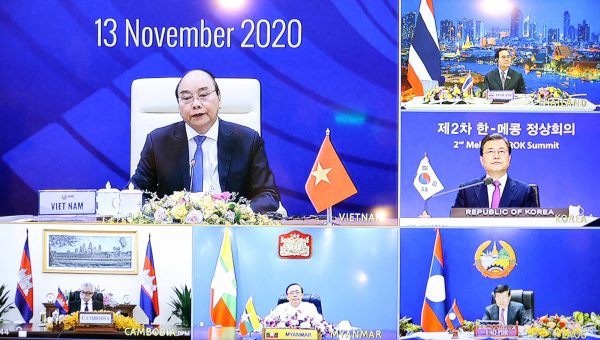Now is the time for Asia to start shaping those agendas.
Biden’s chief economic advisor during the campaign Larry Summers has recommended that he host a special G20 leaders summit in Washington in early 2021 to ‘signal the new administration’s recommitment of the United States to economic cooperation’. Biden has pledged to restore the world’s trust and respect in the United States. A special summit of G20 leaders to coordinate the global response to COVID-19 and the post-pandemic recovery would be an excellent way to do it.
Some might think that next week’s summits don’t really matter given the absence of Biden and the presence of a representative of a lame-duck Trump. They would be wrong. Next week’s APEC and G20 summits are a historic opportunity for Asia’s economies to work together in shaping an ambitious agenda that an incoming Biden administration can feed into and embrace.
What are the priorities? David Vines outlines the core elements of such a plan in this week’s lead article.
The first priority is to ensure Asia’s developing economies have adequate fiscal space. Increased government spending will be vital both in addressing the pandemic and catalysing economic recovery, but shallow financial systems, under-developed capital markets and increased external debt make this difficult. The result will be a slower economic recovery and a prolonged health crisis across Asia and the world.
‘Global cooperation is urgently needed to support Asia’s emerging economies’, says Vines. ‘At the G20 Summit on 20–21 November, leaders need to agree that these countries can run larger budget deficits, by an additional 5 per cent of GDP or even more’. The benefits worldwide would be very large. ‘In countries where extra fiscal support was provided, GDP could increase by more than 2 per cent and employment by up to 5 per cent’ according to Vines. ‘Global output would be pulled up by as much as 1 per cent of global GDP’.
How can the G20 increase the fiscal space of Asia’s developing countries? Much of the action required relates to international financial institutions. Updated figures from the Asian Development Bank show that Asia’s developing countries are getting the equivalent of 39 per cent of their COVID-19 spending from international bodies, particularly the World Bank, the Asian Development Bank and the Asian Infrastructure Investment Bank. This underscores the importance of these institutions to Asia. Bolstering their resources and ensuring their facilities meet the needs of their members are practical steps the G20 can take to boost their fiscal space.
It’s not just about direct financing. Strengthening financial stability within Asia’s developing economies is another critical way in which the G20 can increase the fiscal space in those economies. The G20 can do this by extending bilateral currency swap lines, expanding its debt forgiveness initiative, extending bilateral stand-by loans and bolstering the resources of the IMF and development banks. Each achieves the same objective: boosting investor confidence that these economies can continue to finance their external debts. By helping prevent a negative response from investors, the G20 can ease the macroeconomic constraints that stop governments from undertaking vital spending to address the pandemic and support their economies.
The other major priority is trade. Trade has been a divisive issue in the US election. Tensions between the United States and China have had devastating consequences in Asia. But many of the tensions between these two great powers stem from a common cause: a global trading system that is horribly out of date. The WTO is in desperate need of reform while the global trading rules — which fail to deal with subsidies, state-owned enterprises, technology, digital economy and a host of other issues fuelling tensions — require substantial modernisation.
An incoming Biden administration could emphasise the need for strong rules on international trade. That would send a powerful message to a domestic audience that his administration will be tough on trade while fixing a long-standing problem in global governance. Asian economies should start shaping that agenda. ‘The Indonesian proposals for WTO reform are a significant item on the G20 agenda’, says Vines. ‘In particular, the proposals to resurrect the dispute-settlement procedure’ are critical.
Asian economies need to use next week’s regional summits to agree on a strategy around the implementation of the Indonesian WTO proposal, the restoration of the WTO dispute settlement body and the implementation of Asia’s new flagship trade agreement, the Regional Comprehensive Economic Partnership. WTO reform has been on the G20’s agenda since the 2018 Argentina summit. It’s time to put a strategy around the promise.
The other major priority is climate change. Not only is it a significant priority for the incoming Biden administration, but it also represents an area of strong common interest with Asia, particularly China, in which multilateral cooperation is a key ingredient. ‘Massive plans in the United States, and elsewhere, are already in place to spearhead global recovery from the COVID-19 crisis by investment in green technology, and in renewable power generation’ says Vines. ‘We know that the Biden Administration will ensure the United States re-joins the Paris Climate Agreement, and the COP-26 conference in Glasgow in November 2021 provides an opportunity to take that Agreement forward’.
This week’s APEC and G20 summits are an opportunity to restore the sort of cooperation the world saw in the aftermath of the global financial crisis. More importantly, they represent a significant opportunity for Asian economies to step up, show leadership and bolster the interests of the region. The stakes are too high for low ambition.
The EAF Editorial Board is located in the Crawford School of Public Policy, College of Asia and the Pacific, The Australian National University.

